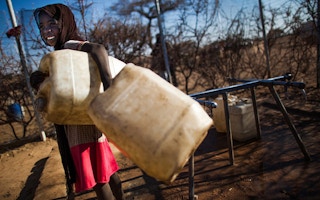Growing water scarcity is now one of the leading challenges for sustainable development, and that challenge is poised to intensify as the world’s population continues to swell and climate change intensifies, FAO Director-General José Graziano da Silva warned.
Competition for water will intensify as humanity’s numbers exceed 9 billion people around 2050 — already, millions of family farmers in developing countries suffer from lack of access to freshwater, while conflicts over water resources already surpass those tied to land disputes in some regions, he noted in remarks made at the Global Forum for Food and Agriculture (19-21 January) in Berlin.
Additionally, climate change is already altering hydrological regimes everywhere, Graziano da Silva said, citing estimates that around one billion people in dry regions may face increasing water scarcity in the near future. These are regions with a high concentration of extreme poverty and hunger.
“
Agriculture and food systems bring all of these global goals together and provide opportunities for a transformational change.
José Graziano da Silva, director-general, FAO
Agriculture is both a major cause and casualty of water scarcity. Farming accounts for around 70 per cent of fresh water withdrawals in the world today, and also contributes to water pollution due to pesticides and chemicals.
To tackle these challenges, the international community created a standalone sustainable development goal (SDG) on water and wove better management of this key natural resource throughout the entire architecture of the SDGs, Graziano da Silva said. Improved water matter is particularly important to the SDGs related to extreme poverty, hunger and malnutrition, and climate change, he added.
“Agriculture and food systems bring all of these global goals together and provide opportunities for a transformational change,” he said.
The FAO Director-General urged listeners to rise to the food security challenges posed by water scarcity on two fronts: first, promoting ways to both use less water and use it more efficiently, and secondly, by taking steps to secure access to water — especially for poor family farmers.
Doing so will not prevent a drought from occurring, he said, but it can help in preventing droughts from resulting in famine and socioeconomic disruption.
Graziano da Silva also said that cutting back on food waste has an important role to play in using water more wisely.
Each year, one-third of the food we produce is either lost or wasted — that translates into a volume of agriculture water wasted equal to around three times the volume of Lake Geneva, he said.
A global framework for action
At the last UN Climate Change Conference FAO launched a global framework for coping with water scarcity in agriculture to support such efforts, Graziano da Silva added.
The framework seeks to support the development and implementation of policies and programmes for the sustainable use of water in agriculture and encourage cooperation among different stakeholders, including civil society, the private sector, financing institutions and development organisations.
“It is time to act. Improved management of natural resources translates into better livelihoods now and in the future,” the FAO Director-General urged.

















